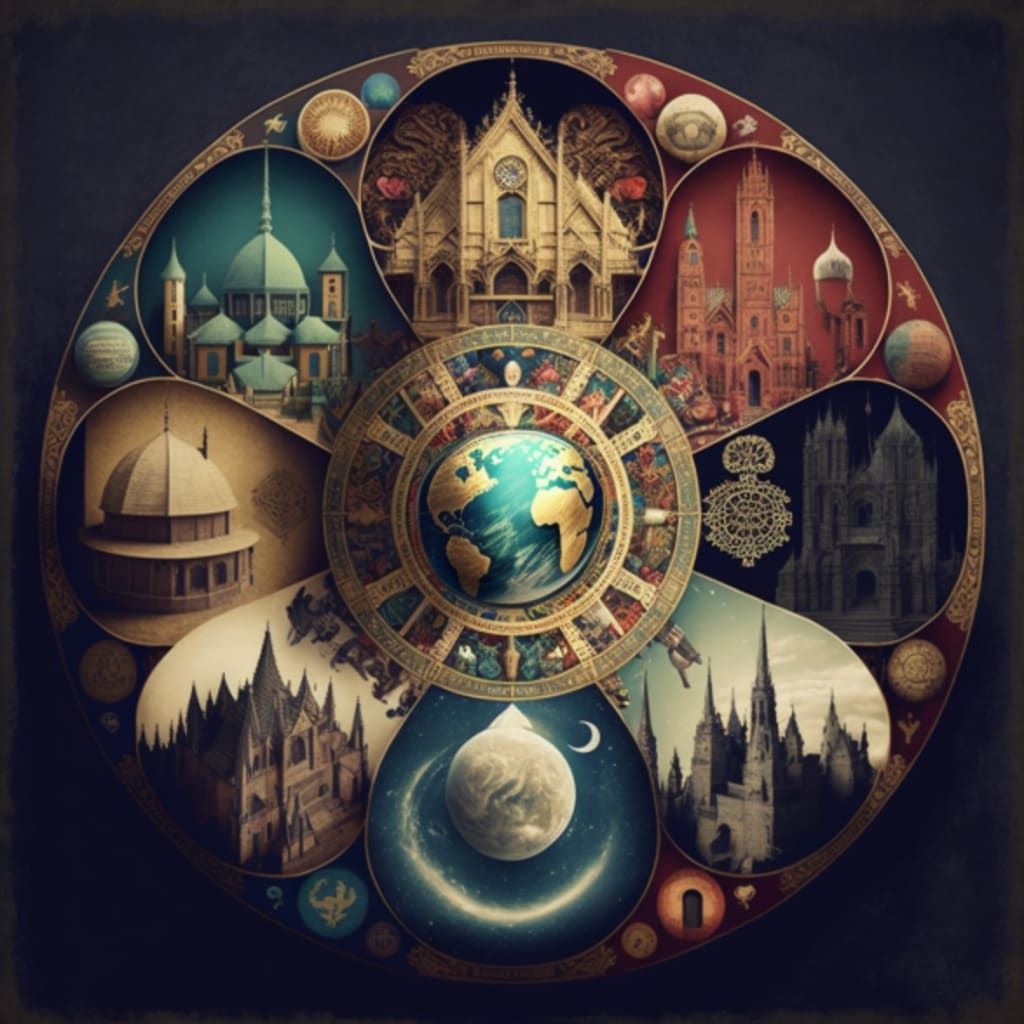Origin and Evolution of Religions of the World
An objective notion from a GenZ's point of view

Introduction
Religion is a complex and multifaceted phenomenon that has played a central role in human society for thousands of years. The origins and evolution of religions are deeply intertwined with the development of human culture, and can be understood through a variety of different perspectives.
In this article, we will try to approach the topic of this topic by looking at the anthropological and sociological factors that have shaped religious beliefs and practices throughout history. From this perspective, religion can be seen as a product of human culture, arising out of the basic human need to make sense of the world and our place in it.
There are mainly three factors of influence of origin and evolution of a religion:
- One of the key factors that has influenced the evolution of religion is the development of human societies and cultures. As human populations grew and became more complex, religious beliefs and practices also became more sophisticated. This can be seen in the development of early agricultural societies, where religious beliefs and practices played a central role in the organization of society and the management of resources.
- Second important factor in the evolution of religions is the rise of new technologies and communication systems. As human societies became more connected and information was shared more easily, new religious ideas and practices were able to spread more quickly and widely. This can be seen in the spread of Christianity, which was able to gain a foothold in many parts of the world thanks to the development of the Roman road system and the ability of Christian missionaries to travel and spread the faith.
- Third important factor in the evolution of religions is the influence of other cultures and religions. As human societies came into contact with one another, they were often influenced by the religious beliefs and practices of other cultures. This can be seen in the spread of Buddhism throughout Asia, which was able to gain a foothold in many different cultures thanks to the influence of the powerful Indian civilization.
Pattern in the Origins of religions of the world:
Let us consider the several religions of the world as examples in sequence parallel to their timeline:
- The Greek, Roman, Egyptian and Hindu ancient religions are all polytheistic, where each natural force was attributed to a deity.
- Zoroastrianism was the first one to introduce the dichotomy of good and evil forces of nature, first as per records of religious texts. And then also introduced the monotheism, which further is taken up by all other religions.
- Judaism, was one of the first religions to introduce the concept of a single, all-powerful God who sets moral guidelines for the behavior of His followers. This concept of one God who is the source of morality, led to the development of a universal moral code that applied to all people, regardless of their social status or ethnicity. The Ten Commandments, for example, serve as a foundation for the moral principles in many Western religions and societies.
- In the case of Christianity, the teachings of Jesus Christ emphasized on love, forgiveness, and compassion, which led to an increase in the moral values of equality, inclusivity, and social justice. But initially started out as a missionary monotheistic religion. The message of Christianity that every person has inherent value and worth, regardless of their background or status, led to the development of a more inclusive society, where marginalized groups like women, minorities, and the poor were given more consideration and rights.
- Islam, on the other hand, developed in a society that was deeply divided by tribal and ethnic differences. The religion of Islam, with its emphasis on submission to God and the unity of all believers, played a key role in unifying the people and promoting a sense of community and inclusivity. The Five Pillars of Islam, which include prayer, fasting, charity, pilgrimage and declaration of faith, reinforced moral values such as self-discipline, compassion, and social responsibility.
In addition to these examples, many religions throughout history have developed moral codes and philosophies that have helped to shape societies and promote the survival and well-being of the human race. These moral values, reinforced by religious beliefs, have led to the development of more inclusive, cooperative, and just societies, where individuals are encouraged to think about the well-being of others and the greater good of the community.
Therefore, the origins of religions are deeply intertwined with the development of human culture and society. Anthropological and sociological factors, such as the development of human societies and cultures, the rise of new technologies and communication systems, and the influence of other cultures and religions, have all played a central role in shaping religious beliefs and practices throughout history.
Pattern in Evolution of the Religions of the World
The most evolved ancient religion of the world is Hinduism, its philosophy of karma led it into philosophy of reincarnation with time, that led to the application of its own philosophy of rebirth and reincarnation on itself as a religion with time, making it the most evolved religion. Understanding it actually gives us a glimpse of evolution in human thinking itself as per the time frame and requirements of our species.
Interesting Evolution of a major ancient religion: Hinduism
Being one of the most complex religions in the world, its evolution has been shaped by a variety of different factors over time. One of the key aspects of Hinduism that has evolved over time is its philosophies. With Dharma and Karma philosophies on one side.
The evolution of Hinduism also includes the development of different philosophical systems, such as Vedanta, which is concerned with the nature of ultimate reality and self-knowledge. The Bhagavad Gita, a famous Hindu scripture, is an example of how these philosophical systems have evolved and been integrated into the religion.
It presents a synthesis of different philosophical and spiritual concepts, such as the path of Karma, the path of devotion, and the path of knowledge. It indirectly encompasses all the religions of the world with this philosophy. As the path of devotion itself if extrapolated with an addition of missionary and Hell-heaven focused concepts and made into a religion, will resemble core concepts of all Abrahamic religions.
In addition to these, Hinduism has also evolved to include a diverse range of religious practices and rituals(an extension of the ancient Vedic fire practice), such as puja (worship), yoga, and meditation. Some of these practices have been shaped by the changing needs of society and have been adapted to promote physical, mental and spiritual well-being.
Interesting enough, most unique evolution of it is the Vedanta, one of the most important philosophical systems within Hinduism, and it has played a key role in the evolution of the religion over time. The term "Vedanta" literally means "the end of the Veda," and it refers to the Upanishads, which are a collection of texts that are considered to be the final and most important part of the Vedic literature.
Vedanta philosophy is rooted in the idea of the ultimate unity and oneness of all reality, which is known as Brahman. This concept of Brahman is the ultimate reality and the self, and it is the foundation of the moral and ethical principles that govern individual behavior in Hinduism. The concept of Brahman is closely related to the idea of Atman, which is the individual self, and the ultimate goal of Vedanta philosophy is to realize the unity and oneness of Atman and Brahman.
Over time, the Vedic religion evolved into a Vedantic religion, with a greater emphasis on the spiritual and philosophical aspects of the religion and started having less influence on political and economic activities. This evolution can be seen in the development of various schools of Vedanta, such as Advaita Vedanta, which emphasizes the non-duality of Atman and Brahman, and Vishishtadvaita Vedanta, which emphasizes the unity of Atman and Brahman, but with a distinction between the two.
One of the most important contributions of Vedanta philosophy to the evolution of Hinduism is the concept of "Vasudeva Kudumbakam," which means "the whole world is one family." This concept reflects the universalistic nature of Vedanta philosophy, which holds that all individuals are ultimately united in the ultimate reality of Brahman. This idea of unity and oneness has led to a more inclusive and compassionate understanding of the world, and it has played a key role in shaping the moral and ethical principles of Hinduism. This evolution of human thinking, as seen in the development of Vedanta philosophy, has been instrumental in shaping the moral and ethical principles of Hinduism, making it one of the most inclusive religions in the world. Thanks to its evolution with human thinking and needs of the species.
What does this say about the religions of the world?
The evolution of human society can be observed here. At the beginning, every human being was a nomad belonging to different hunter-gatherer tribes, the main requirement of tribes was survival, the necessity and multiple number of tribes led to polytheistic paganism along with fire ritual practices in the early civilizations. And when the societies started using proper agricultural practices extensively and became sedentarily settled, the requirements became new, as survival was a little ensured, people had the opportunity to think about abstract things other than primitive survival activities, and thus, the organized religions started with monotheism to unite the people in the sedentarily settled proper agriculture-based society. The moral principles, judicial activities, political activities for maintenance of the society were all happening parallelly with religion, though it sufficed that period’s requirement of harmony by reinforcement of ethics using hell-heaven beliefs, on the other hand, it was also used as a means of political power. But then, with more advancements in the society, the people became more educated and logical, the requirements of the society started to change, then came the high universalistic philosophies that are totally inclusive and logical, such seen in Hinduism’s Vedanta Philosophies, meditation and other spiritual activities, that separates the religion totally from politics or economics and made it more of an individual’s personal pursuit. So, the religions of the world have evolved with time due to the different situational and cultural requirements of the society in a particular time period but the core of all the religions have always remained the same Humanitarianism that promotes humanity’s survival along with maintenance of Nature’s great balance.
Conclusion
In conclusion, the evolution of religions has been a continuous process, shaped by the changing beliefs, philosophies, and human thinking. Throughout history, religions have played a crucial role in the survival of the human race by reinforcing moral values that promote inclusivity, cooperation, and social harmony, which are key to the survival of human societies using fear of unknown myths like hell-heaven. Overall, it is very interesting on how the human thinking has prevailed and led to the same exact ideal universalistic philosophy as any particular religion’s core concept at the end, in all different religions around the world, which is humanitarianism. And mainly religions ideally got separated from political and economic activities to become more of an individual’s personal mental or spiritual well-being and own pursuit in search of the source of cosmos in their own ways. So, ultimately truly fulfilling the purpose of any religion.





Comments
There are no comments for this story
Be the first to respond and start the conversation.